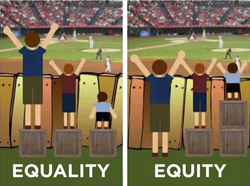This is why parents with more than one kid/teen need more than one set of rules
/
Any parent with more than one child knows that their kids have vastly different personalities, strengths, weaknesses and interests.
Because of this, they will have different things they need us as parents to do for them.
Some young people need our help with reassurance and help coping with worries. Some need our help managing their frustration. Some need help resolving conflict. Some need help with maintaining concentration and attention with homework.
Some need help to find things to do on their own, some need help initiating contact with others.
If kids and teens have different personalities and different needs from us as parents - why do we try to have the same rules for children?
Because we want our children to see us as fair.
Because we have to deal with their frustration.
To be honest, it's just easier to set one set of rules for all the kids/teens, or just vary the rules according to age alone.
Unfortunately the less hassle comes at the expense of coming up with the guidelines, systems and rules for each of our young people that they individually need and will benefit from.
My advice is this:
Have different rules for different kids and teens - based on what they really need from you - not based on what other our other children have needed.
Keep teaching kids and teens about the difference between simple equality and true equity. Use the picture above as a starter.
P.S. You asked for it!
Thanks so much for completing my survey last newsletter. Over 100 of you responded to tell me what you do and don't want from these emails.
The vast majority asked for more frequent emails - but for them to be short!
So as of today I have committed to providing fortnightly, brief articles about supporting kids and teens - quick and practical tips about helping kids through tough times, build resiliencey and cope with frustration, worry and sadness. You also suggested you would like short videos too, so on occasion I will send you 3 minute video with ideas too. The short articles and videos will be here on the blog, but I will send you an email so you know the topic and when they arrive.
Really appreciate your feedback. As always, if you have something else you would like to add please feel free to email me directly any time at developingminds.net.au
(Did you win?!?! We have randomly selected people who responded to receive a free copy of When Life Sucks for Teens: tips, tactics and ideas for teens in commonly faced tough life situations)




